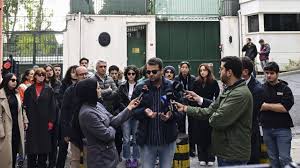Italy halts student visa applications for Turkish students

Rome: iData, the only authorized institution for Italian visa applications in Türkiye, announced that student visa applications for certain academic programs will no longer be accepted.
After extensive coverage of the situation in national and international news, the institution removed the announcement from its website, causing further confusion among students.
The page of the announcement shows a 404 error, which means it was removed from the website.

No further explanation has been provided by iData yet, leaving the situation in limbo.
The announcement had stated that the situation includes three-year undergraduate programs, master’s programs, annual Erasmus programs, single-course university classes, and arts and music programs.
According to the announcement, visa applications would only be accepted for:
One-year university master’s programs
Multi-year doctoral programs
Language courses
Foundation (preparatory) programs
Erasmus programs that are shorter than one year
The announcement, effective Dec. 2, cited no exceptions for the excluded categories.
Italy halts student visa applications for Turkish students
iData’s statement on their website about the education visa.
Turkish students report mismanagement and increased visa rejection
In our exclusive report, we mentioned that nearly 1,000 Turkish students, many accepted into top Italian universities, claimed mishandling of their visa applications by the Italian Consulate in Istanbul. Reports indicate:
Long waiting times: Students waited three to four months for responses, only to face rejections.
High rejection rates: Over 50 rejection letters were issued after Nov. 24, with only a few students granted visas.
Erroneous rejection letters: Some letters contained misspelled names or incorrect university and faculty details.
One student noted receiving a rejection despite holding a green passport, which typically allows visa-free travel within the Schengen area.
Italy halts student visa applications for Turkish students
Students who gained admission to Italian universities but say they are facing delays or have been denied visas gather outside the Italian Consulate in Istanbul, Türkiye, Nov. 14, 2024. (IHA Photo)
Financial losses and academic delays
Students stated financial and academic setbacks due to the Italian Consulate’s errors. Claims of mismanagement included:
Financial hardship: Visa rejection resulted in lost tuition fees and travel costs.
Threats and corruption: Reports surfaced of irregular practices, leading students to escalate complaints to Türkiye’s Ministry of Foreign Affairs.
Despite assurances from Italian authorities that there are “no barriers” to their education, uncertainty continues for the students.
Italy’s Deputy Prime Minister and Minister of Foreign Affairs Antonio Tajani stated that no obstacles are preventing Turkish students from pursuing education in Italy while acknowledging delays in visa processing because of high demand.
Visa applications take time. We are working to increase the number of staff at our consulates. When demand is high, consulates work as quickly as possible to handle the influx.
According to statistics from the European Commission, the rejection rate for Schengen visa applications for Turkish citizens was 9.7% in 2019, but this number surged to 16.1% in 2023. Experts have observed that the number of rejected applications has been rapidly increasing this year.
The visa process, which has already become a challenge for overseas education, is now disrupting students’ future plans and influencing their choice of study destinations.
According to a report by Hurriyet, Eren Goker outlined the current situation across various countries:
Germany: It is known to be one of the hardest countries to secure an appointment with, despite having a high student visa approval rate. However, the waiting times for appointments are notably long.
Poland: Getting an appointment is nearly impossible, and rejections are common. Poland has been facing similar issues globally, after incidents of visa irregularities in previous years.
Italy: Another country with strict visa processes. Students must prove they can cover their expenses not just for the first year but for the entire duration of their studies.
France: One of the few countries where students are not facing major issues. This is because students are pre-screened by Campus France as part of the visa process.
United Kingdom: The U.K. remains the most straightforward option for both student and tourist visas.
United States: Visa success rates are high. Since interviews are in person, thorough preparation beforehand can significantly increase the chances of approval.
The increasing difficulty of securing student visas has cast a shadow over the dreams of many Turkish students planning to study abroad. While certain countries like the United Kingdom remain more accessible, students facing complications in countries like Poland, Italy, and Germany are left with few options but to wait—often at great financial cost.
According to a report by the Turkish daily Hurriyet, Gokhan Ozdemir stated, “Visa appointments are now being traded on the black market. This issue has been exploited by hackers who use system loopholes to secure appointments for a fee. The cost for this service has reached as high as €800 ($837.42). However, securing an appointment only guarantees the opportunity to apply—it doesn’t guarantee the visa.”
The process of obtaining a student visa for foreign education has become more challenging across the board, with the exception of the United Kingdom. Eren Goker, head of the International Education Consultants Association, explained: “Visa processes have become more difficult in all countries. Countries like France, Italy, and Greece, which used to offer immediate visa applications, are now almost impossible to even get an appointment with. Many European Union countries cite a decrease in the number of civil servants after the pandemic as the cause. However, I believe there are other factors at play as well.”





